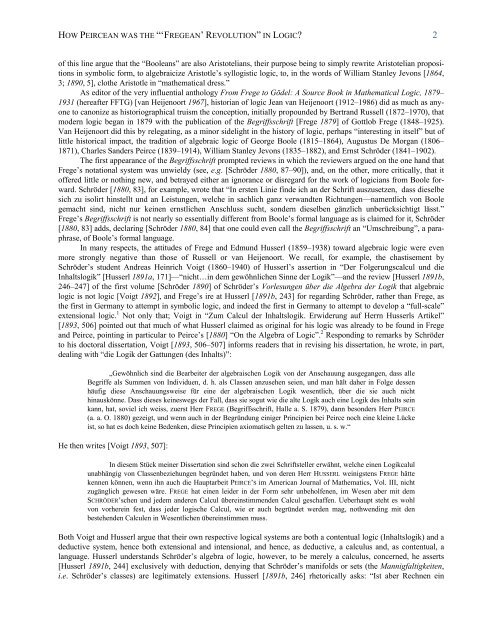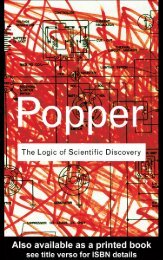Create successful ePaper yourself
Turn your PDF publications into a flip-book with our unique Google optimized e-Paper software.
HOW PEIRCEAN WAS THE “‘FREGEAN’ REVOLUTION” IN LOGIC? 2<br />
of this line argue that the “Booleans” are also Aristotelians, their purpose being to simply rewrite Aristotelian propositions<br />
in symbolic form, to algebraicize Aristotle’s syllogistic logic, to, in the words of William Stanley Jevons [1864,<br />
3; 1890, 5], clothe Aristotle in “mathematical dress.”<br />
AS editor of the very influential anthology From Frege to Gödel: A Source Book in Mathematical Logic, 1879–<br />
1931 (hereafter FFTG) [van Heijenoort 1967], historian of logic Jean van Heijenoort (1912–1986) did as much as anyone<br />
to canonize as historiographical truism the conception, initially propounded by Bertrand Russell (1872–1970), that<br />
modern logic began in 1879 with the publication of the Begriffsschrift [Frege 1879] of Gottlob Frege (1848–1925).<br />
Van Heijenoort did this by relegating, as a minor sidelight in the history of logic, perhaps “interesting in itself” but of<br />
little historical impact, the tradition of algebraic logic of George Boole (1815–1864), Augustus De Morgan (1806–<br />
1871), Charles Sanders Peirce (1839–1914), William Stanley Jevons (1835–1882), and Ernst Schröder (1841–1902).<br />
The first appearance of the Begriffsschrift prompted reviews in which the reviewers argued on the one hand that<br />
Frege’s notational system was unwieldy (see, e.g. [Schröder 1880, 87–90]), and, on the other, more critically, that it<br />
offered little or nothing new, and betrayed either an ignorance or disregard for the work of logicians from Boole forward.<br />
Schröder [1880, 83], for example, wrote that “In ersten Linie finde ich an der Schrift auszusetzen, dass dieselbe<br />
sich zu isolirt hinstellt und an Leistungen, welche in sachlich ganz verwandten Richtungen—namentlich von Boole<br />
gemacht sind, nicht nur keinen ernstlichen Anschluss sucht, sondern dieselben gänzlich unberücksichtigt lässt.”<br />
Frege’s Begriffsschrift is not nearly so essentially different from Boole’s formal language as is claimed for it, Schröder<br />
[1880, 83] adds, declaring [Schröder 1880, 84] that one could even call the Begriffsschrift an “Umschreibung”, a paraphrase,<br />
of Boole’s formal language.<br />
In many respects, the attitudes of Frege and Edmund Husserl (1859–1938) toward algebraic logic were even<br />
more strongly negative than those of Russell or van Heijenoort. We recall, for example, the chastisement by<br />
Schröder’s student Andreas Heinrich Voigt (1860–1940) of Husserl’s assertion in “Der Folgerungscalcul und die<br />
Inhaltslogik” [Husserl 1891a, 171]—“nicht…in dem gewöhnlichen Sinne der Logik”—and the review [Husserl 1891b,<br />
246–247] of the first volume [Schröder 1890] of Schröder’s Vorlesungen über die Algebra der Logik that algebraic<br />
logic is not logic [Voigt 1892], and Frege’s ire at Husserl [1891b, 243] for regarding Schröder, rather than Frege, as<br />
the first in Germany to attempt in symbolic logic, and indeed the first in Germany to attempt to develop a “full-scale”<br />
extensional logic. 1 Not only that; Voigt in “Zum Calcul der Inhaltslogik. Erwiderung auf Herrn Husserls Artikel”<br />
[1893, 506] pointed out that much of what Husserl claimed as original for his logic was already to be found in Frege<br />
and Peirce, pointing in particular to Peirce’s [1880] “On the Algebra of Logic”. 2 Responding to remarks by Schröder<br />
to his doctoral dissertation, Voigt [1893, 506–507] informs readers that in revising his dissertation, he wrote, in part,<br />
dealing with “die Logik der Gattungen (des Inhalts)”:<br />
„Gewöhnlich sind die Bearbeiter der algebraischen Logik von der Anschauung ausgegangen, dass alle<br />
Begriffe als Summen von Individuen, d. h. als Classen anzusehen seien, und man hält daher in Folge dessen<br />
häufig diese Anschauungsweise für eine der algebraischen Logik wesentlich, über die sie auch nicht<br />
hinauskönne. Dass dieses keineswegs der Fall, dass sie sogut wie die alte Logik auch eine Logik des Inhalts sein<br />
kann, hat, soviel ich weiss, zuerst Herr FREGE (Begriffsschrift, Halle a. S. 1879), dann besonders Herr PEIRCE<br />
(a. a. O. 1880) gezeigt, und wenn auch in der Begründung einiger Principien bei Peirce noch eine kleine Lücke<br />
ist, so hat es doch keine Bedenken, diese Principien axiomatisch gelten zu lassen, u. s. w.“<br />
He then writes [Voigt 1893, 507]:<br />
In diesem Stück meiner Dissertation sind schon die zwei Schriftsteller erwähnt, welche einen Logikcalul<br />
unabhängig von Classenbeziehungen begründet haben, und von deren Herr HUSSERL weinigstens FREGE hätte<br />
kennen können, wenn ihn auch die Hauptarbeit PEIRCE’S im American Journal of Mathematics, Vol. III, nicht<br />
zugänglich gewesen wäre. FREGE hat einen leider in der Form sehr unbeholfenen, im Wesen aber mit dem<br />
SCHRÖDER’schen und jedem anderen Calcul übereinstimmenden Calcul geschaffen. Ueberhaupt steht es wohl<br />
von vorherein fest, dass jeder logische Calcul, wie er auch begründet werden mag, nothwending mit den<br />
bestehenden Calculen in Wesentlichen übereinstimmen muss.<br />
Both Voigt and Husserl argue that their own respective logical systems are both a contentual logic (Inhaltslogik) and a<br />
deductive system, hence both extensional and intensional, and hence, as deductive, a calculus and, as contentual, a<br />
language. Husserl understands Schröder’s algebra of logic, however, to be merely a calculus, concerned, he asserts<br />
[Husserl 1891b, 244] exclusively with deduction, denying that Schröder’s manifolds or sets (the Mannigfaltigkeiten,<br />
i.e. Schröder’s classes) are legitimately extensions. Husserl [1891b, 246] rhetorically asks: “Ist aber Rechnen ein





